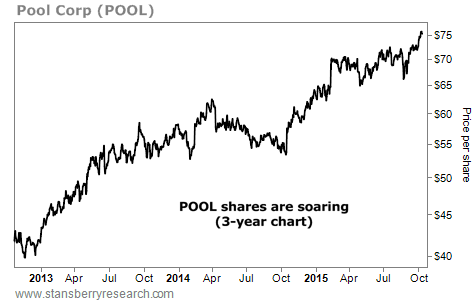| Home | About Us | Resources | Archive | Free Reports | Market Window |
|
Editor's note: Today, we're sharing a must-read essay by Agora founder and New York Times bestselling author Bill Bonner. Below, Bill explains why the Fed's decision to ban insider trading didn't level the playing field... It tilted it even more in the insiders' favor...
Why ALL Insider Trading Should Be Made LegalBy
Wednesday, October 14, 2015
Today, let's look at how the stock market reacts to new technology.
Investors are supposed to look ahead. They are expected to dope out the future earnings of technology stocks and figure out their present value.
Not that they know immediately and to the penny what Twitter or Tesla should be worth. But markets are always discovering prices, based on public information flowing to investors.
The problem is that the feds have distorted... twisted... and outright counterfeited this information. They falsified it for the benefit of the people it's supposed to be protecting us against – the insiders.
The entire edifice of federal regulation and policing is a scam – at least when it comes to the stock market...
First, the feds claimed to be creating a "level playing field" by prohibiting "insider trading."
If you had privileged information – say, as the accountant for a Fortune 500 company... or the lawyer for an upcoming merger – you were supposed to play dead.
"Front-running" – buying or selling in advance of the public release of information – is against the law. And in 1934, Congress set up a special bureaucracy – the Securities and Exchange Commission (SEC) – to enforce it.
But the SEC never leveled the playing field. Instead, it tilted it even more in the insiders' favor.
Those who knew something were not supposed to take advantage of it. So this information became even more valuable.
That is why so many investors turned to "private equity." Insiders at private companies – held close to the vest by the investment firms that owned them – could trade on all the inside information they wanted.
The law prohibits insiders from manipulating a publicly traded stock for their benefit.
But there's an odd exemption for the people who control a public company. General Motors (GM) announces a share-buyback plan, for example. It will spend $5 billion to buy back its shares in the open market and then cancel them. (This raises the earnings per share of the outstanding shares, making them more valuable as a result.)
Why would an automaker – recently back from the dead, thanks to a handout from the feds – take its precious capital and give it to management (in the form of more valuable stock options) and shareholders (in the form of higher stock prices)?
There you have your answer: GM execs and their insider shareholders (mostly hedge funds) joined forces to manipulate the stock upward and give themselves a big payday.
Reports the Harvard Business Review:
I disagree... The feds should not ban share buybacks. Instead, insider trading should be legal for everyone.
And the feds shouldn't bail out the insiders, either. The government bailed out GM to the tune of $50 billion in return for a 61% equity stake in the company.
But at the end of 2013, Washington was able to sell off the last of its GM shares... for "just" an $11 billion loss.
How?
The Fed fiddled with stock market prices... by pushing down the so-called "risk-free" rate on bonds. (A lower rate means less opportunity cost for stock market investors.)
Just look at the valuations of today's tech companies. They're over the top, much like they were at the peak of the dot-com bubble in 2000. They are driven to extraordinary levels, not by a prudent calculation of anticipated earnings, but by the Fed's EZ-money regime.
This conclusion, by the way, was buttressed by our look at the automakers of 100 years ago.
Now, there was a game-changing industry!
It was so promising and so crowded with new entrants that you could barely walk down Shelby Street in Detroit without getting run over by an automobile you'd never heard of.
Most of those companies went broke within a few years. A few, however, prospered.
GM's share price barely budged between 1915 and 1925 – when the company was one of the greatest success stories of the greatest new tech industry the world had ever seen.
But then, in 1927, the influential New York Fed president Benjamin Strong gave the market "a little coup de whiskey."
The Fed not only bought $445 million of government bonds, resulting in the biggest increase in bank reserves the U.S. had ever seen, but it also cut its key lending rate from 4% to 3.5%.
After that, it was off to the races! GM shares rose 2,200%.
In other words, the prices of "tech" stocks were manipulated then – as now – by the feds.
Cheap credit – not an honest calculation of anticipated earnings – is what sent GM soaring in the late 1920s.
And it is why our Billion-Dollar Tech Babies are flying so high today.
Regards,
Bill Bonner
Further Reading:
Find more of Bill's insights in DailyWealth right here:
"In economics, we reach the point of diminishing returns with numbers very quickly. They gradually become useless. Later... they become disastrous."
"Not a single statistic can be trusted. Yet economists build with them as though they were bricks."
"Take the whole U.S. federal budget and divide it up. And now we have the poorest people in America with household incomes of about $55,000."
Market NotesWHAT OUR 'POOL' INDICATOR IS SAYING ABOUT THE ECONOMY Today, we check in on our "POOL" indicator to get a read on the American economy...
Regular DailyWealth readers know a handful of businesses serve as our economic indicators. Our recent examples include expensive clothing company Under Armour, 3D movie theater IMAX, and cruise line Carnival. The profits and share prices of these companies can tell you a heck of a lot more about the economy than any government official can.
Another example of this is Pool Corp (POOL). As the country's largest distributor of swimming-pool supplies and products, Pool Corp acts as a great way to measure the health of the economy. Swimming pools are "want" items, not "need" items... So when POOL shares are in an uptrend, it's a good sign for America.
As you can see from the chart below, Americans are feeling flush with cash right now. Shares are up around 20% in 2015 and just struck a new 52-week high. Our "POOL" indicator tells us once again that things are looking up...
 |
Recent Articles
|



